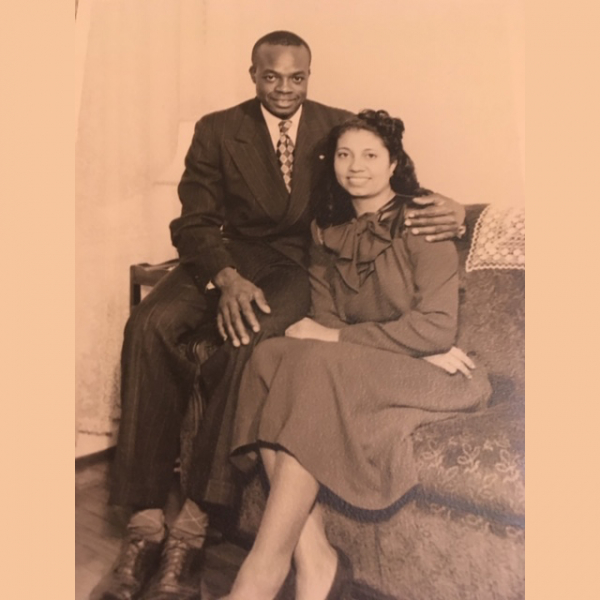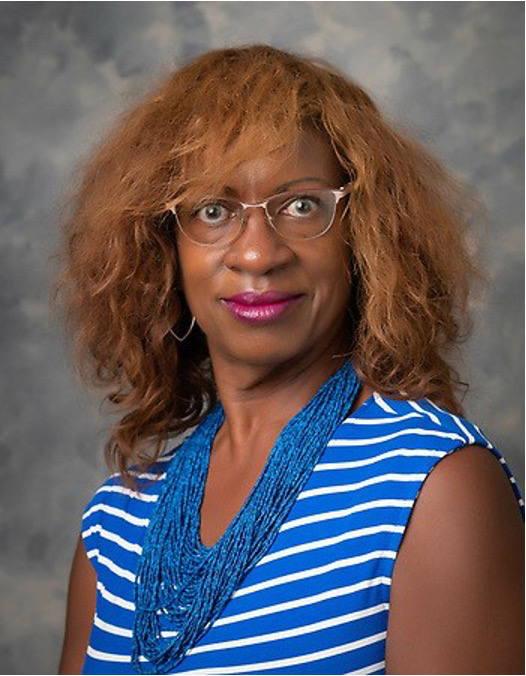Alumna Establishes Fund to Honor Parents; Support Transformational Diversity, Equity, and Inclusion Opportunities

Dr. Miriam Mobley Smith, BSPharm’78, with the support of her family, established the Emmett and Ruth Mobley Memorial Endowment Fund in February 2020. The Fund, including any additional gifts from other donors, will provide the College with additional financial resources to support transformational opportunities that create and foster an academic environment that encourages dialogue and alternative narratives. The Fund may be used to stage lectures that underscore the importance of diversity, equity, and inclusion, for direct student support, outreach efforts, and more. Dr. Mobley Smith shared her reasons for starting the fund, goals, and career perspectives in a recent interview.
U-M Pharmacy: Why did you start this fund?
Dr. Mobley Smith: It starts with my parents and their deep commitment to higher education as a path to success. My sisters, brother, and I were the first generation college graduates on either side of my family. My parents, natives of Valdosta, GA, did not take a “traditional” path to success. After leaving school to help support his family, my father joined the Navy, got his GED, migrated to Michigan, and earned an electrical apprentice at Ford Motor Company. He eventually worked his way up the ranks to electrical contractor, was instrumental in administering the certification process for other electricians in the Detroit area, and was elected the first Black president of the local Electrical Inspectors of America Association. My dad was ill on and off, and my mom went to work when he was unable to. My mom had taken a few college classes, but did not complete her degree.
That inspiration and motivation from our parents paid dividends for my siblings and I, we all became leaders in our chosen fields. Our parents were our greatest cheerleaders.
I was thinking about how I should best honor my parents’ legacy, it seemed like the appropriate place was the school where I started my pharmacy training and turned some negative experiences into good moving into the future. My siblings and I are a united front in supporting this fund, even though they did not go to pharmacy school.
I had some interesting challenges during my education and in my career. The first thing people see is the color of your skin, unfortunately it was not always what you know setting the tone of a job or internship interview. I wanted to experience all of pharmacy practice, but some doors were not open to me. I wanted more, so I went about getting my hospital and industry experience in ‘nontraditional’ ways. When I could not get an internship in the hospital, I volunteered at the hospital as a ‘pink lady,’ who would deliver flowers to patients and so on. I asked for my assignment to be in the pharmacy, which was how I got my first experience in hospital pharmacy.
I got my industrial internship with Parke Davis in a similar way – I worked for Parke Davis as a industrial engineer (aka janitor). I parked my mop in front of the director of professional and trade relations’ door, explained that I learned from getting in on the ground floor and made good money to support my education, but it was time for me to be considered for their internship. I submitted my application and was selected. That thread wove itself through my career: fighting for yourself and understanding what you need to do to get the job done, while building that underpinning of education.
As I was finishing my degree at Michigan, I worked as a pharmacy technician at a local community hospital. The individual who I was working for said, ‘we love you Miriam, but as long as I am here, there will never be a black pharmacist, let alone a black woman pharmacist working in this pharmacy.’ It gave me righteous indignation, I went on to pass my boards and get a job. I wanted to show people that people of color can hold professional healthcare roles and leadership roles. There are many times where I have been one of one or two people of color on leadership committees or in national positions. You cannot tell me that there are not people who are capable, they just need the opportunity. But the other part of this is sensitizing people to the fact that they should stop being myopic about hiring, training, education, and giving people opportunities, that they need to broaden their horizons.
U-M Pharmacy: Near and long term, what impact do you hope the fund will make?
Dr. Mobley Smith: To provide some financial infrastructure to assist individuals who are looking to be successful. Another piece is to help educate others on the value of diverse environments in academia. I hope this will support increasing the diversity among Pharmacy faculty members. There are certainly qualified individuals out there, I hope that these funds will support a vehicle of information dissemination, connecting qualified candidates with open positions in the College, bringing in visiting researchers, so people get the opportunity to meet and learn from each other. I hope that more faculty of color will consider Michigan a destination of choice and for members of faculty search committees to learn about the contributions of individuals from diverse backgrounds.The final piece is connecting with the community. I would like the fund to provide seed money to faculty, primarily in pharmacy practice, working in communities in need to address health concerns. I want these funds to help faculty members and students to understand how to best work with diverse communities to improve health and overall outcomes. I think this will help with diverse faculty and student recruitment as well, Michigan Pharmacy will be able to say that it is living its values and producing a “living laboratory” and identifying best practices for overcoming health disparities. I am so happy to pay it forward by providing these resources.
U-M Pharmacy: How do you hope your fellow alumni and pharmacy professionals will help support these efforts?
Dr. Mobley Smith: I know I am not alone among my fellow alumni and colleagues in wanting to support this cause at the College. Anyone with a similar passion is able to contribute directly to the fund. I know my fellow alumni will want to help elevate opportunities for qualified students and faculty, but also help to spread broadly the value of diversity and inclusion as it pertains to educating the next generation of pharmacists. I hope that this fund serves as a catalyst for change and for others to commit to supporting this change. The College is committed to this work, and I know my fellow alumni share that commitment and want to help propel it forward.
U-M Pharmacy: Why did you decide to go to pharmacy school?
Dr. Mobley Smith: I had decided to attend the University of Michigan, but I was not sure which career track I wanted. I took the course catalog and started thumbing through it. Nothing was piquing my interest, until I got to the back where pharmacy courses were listed at the time. I got in touch with Valener Perry, who was in charge of student services. She offered me the opportunity to attend a summer program – an introduction to pharmacy. I found it so interesting and I knew I could do it. Whenever I wavered on my path, Dean Perry kept me focused on my calling. The more I got involved, the more I saw how I could make an impact. Drs. Eddie Boyd and Leslie Shimp showed me how I could affect older adult communities. My career path was nebulous to me as a young adult, but the faculty and Dean Perry helped show me that I had made a wise choice and the rest is history. Dean Perry meant so much to me; I started out supporting her fund at the College. With this fund, I wanted to honor what she embodied and build on the work she had done for the College.
U-M Pharmacy: What inspired you to work with older adults?
Dr. Mobley Smith: A medication misadventure that ended up killing my great aunt. Not enough communication went on and she double dosed and had a major GI bleed, had a heart attack and died. This happened because she did not have much money, had public assistance, and went from doctor to doctor and pharmacy to pharmacy. There was no continuity, she was double-dosing with the same medicine, one with a brand name and the other a generic name. It was all preventable. My work with older people in underrepresented communities is fueled by that experience. I want to prevent what happened to my aunt from happening to anyone else or anyone else’s family member.
U-M Pharmacy: How has your career evolved?
Dr. Mobley Smith: Pharmacy opens so many doors, I stopped counting the potential careers at 170. Many times in my career, I have been not only the first person of color to do something, but also the first person with a pharmacy background in a position, things that I never would have imagined that pharmacists could do when I first started out. How would I know that you could be a Primary Healthcare Policy Fellow for the Department of Health and Human Services or the chair of an advisory committee for the Centers for Medicare and Medicaid Services? Or that I would help advise the Obama administration on the implementation of the Affordable Care Act, and be on a conference call with the president of the United States and Secretary Sebelius? Who would have thought that little girl from Ecorse, MI who wasn’t sure what her future would hold, would end up doing those kinds of things let alone being in two dean seats at colleges of pharmacy across the US?





